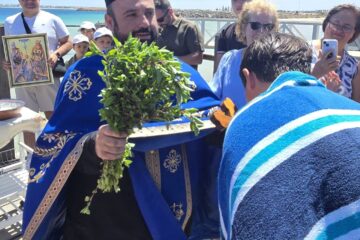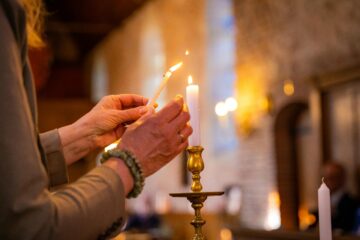The following in an excerpt from “Eros of Orthodoxy,” translated by Fr. Nicholas Palis and written by Mr. Pantelis Paschou.
It has been said of this parable that even if all of the holy text of the Old and New Testament was lost, and only this parable was saved, it would suffice for us to feel the infinite majesty of our heavenly Father, of His kindness and compassion. It is for us to see the depth of the mystery of God’s incarnation and the salvation of man. And this statement which stresses the great importance of this parable is not an exaggeration. Because this parable of the Prodigal son, is the most perfect summary and the most poetic synopsis of the whole Gospel.
From the synaxarion of the day we learn that the Holy Fathers of the Orthodox Church, ordained this parable to be read on the 2nd Sunday of Lent for the following reason. Because many young people who slip into sin, are more easily badly influenced into many prodigalities…And falling into the abyss of despair, they think that there exists no hope of salvation for them. They don’t want to struggle to obtain virtue again, but they fall all the more deeply into the mire, thinking that there is no hope left for them. For this exact reason the Holy Fathers, wishing to pull these sinners out of the verge of the abyss of despair, place the parable of the Prodigal Son here, to show the philanthropy, the long suffering and the paternal compassion of God towards his creation who has fallen into sin. That there is no sinner and no sin, no matter how great it is, which can overcome the infinite compassion and philanthropy of God.
This paternal position of the infinite compassion of God which accepts with an open and very warm embrace each of his “prodigal sons” that is each of us, disarms certain men who believe that their sins are so many and so terrible that neither man nor God can forgive them. Let them hear Saint John Chrysostom together with all the Holy Fathers of our Church who preaches: “the ocean has limits, but the divine compassion of God doesn’t have limits!” Which river, of our foul and great sins, can not fit in the infinite sea of God’s compassion? No matter how great the weight and the nature of our sins, true repentance, the shocking “I have sinned” of the prodigal, has the power to open the doors of our “paternal” home, the heart of our compassion-loving Father and God.
No other parable has so much depth that it reveals God’s deep loving kindness and philanthropy. And such width, that it contains, in a few lines, God’s majesty, together with all the drama of man: both of the righteous—in the person of the older, the prudent son—and of the strayed one, the sinner, the prodigal. In these two characters of the parable we all exist. And we all need the mercy and forgiveness of our magnanimous Father, and God. Both the “righteous” who are represented in the parable by the older son, and the prodigals. And here’s why: The older son presents himself to us in the parable as being prudent, obedient, industrious, dedicated to paternal commands and services. But when his lost brother returned, and he saw his father open his heart and home to him, he envied his “sinful” brother. The elder and prudent son, as a young Greek religious commentator notes “incarnates the letter of the law, but is far from its spirit. He might have stayed by his father’s side, he might have always respected his commands, but his heart is not inflamed by love, which made his father be the “burning but not inflamed bush.” He didn’t have love “which exceeds knowledge” (K. Bastia, New Kyriakodromion p. 54). The older son had the prudence to always listen to his father and never to depart far from his side–in this he may be an example to imitate. But love for his brother and for man had not taken root deep in his heart…His heart had become so narrow by the letter of the law, and had dried so much by his formal “prudence,” that when his father, in order to make him come to his senses, told him: “my child, you were always by my side and all of my things are yours. You should also have rejoiced and been happy because that brother of yours was dead and now he arose, and he was lost and is found.”
He shall remain an eternal example for those who are stuck like oysters to the letter of the law, who judge and condemn the sinners, instead of showing understanding and love to those, who God sees is ready, as soon as He hears one saying: “I have sinned” and “have mercy” and “receive me.” He receives them with great joy in heaven and paradise, according to his word: “there is great joy in heaven, over one sinner repenting.”
The prodigal son, who squandered the wealth of his paternal gift and corrupted his “in the image,” with his unmentionable sins, “he joined the beasts and became like them”. In the end, “he joined himself” to a swineherd and he tried to satisfy his hunger with the carob beans, which fell from the mouths of the swine. Here let’s remember the wise observation of Saint Nikephoros Kallistus Xanthopoulos: “sin is an insatiable thing, attracting by habit through temporary pleasure” that which carobs are an image of, food for swine. For the carobs first present themselves as sweet and afterwards end as harsh and straw-like, that way sin is always achieved. Because just as the carob beans at first leave a sweetness in our mouth and afterwards remain a tasteless, harsh and straw-like thing, exactly as sin.
Up to this point is the first part of the life of the prodigal, who is an example for all of us–to be avoided of course. And I say for all of us because there is no one, who has kept the Paternal gift incorrupt and preserved in total. All of us are sinners. And we all resemble, to a greater or lesser degree, the first part of the prodigal’s life..
But if the first part of the Prodigal’s life, which most of us have made our own, is a striking example to be avoided, the second comes, about the return, which we must all imitate: without any delay and without any doubt. Knowing that our Father, from whom we were separated, by falling into whatever kind of sins we committed, will receive us if we repent and return near Him, like the Prodigal. He will receive us in His affectionate embrace. He will show us paternal compassion. He will again put the ring that shows the grace of the Holy Spirit on our hand. He will again put the new clothes and shoes on us “the first garment.” And afterwards He will kill “the fatted calf,” His Only Begotten Son, in order to present His heavenly table, the Incorrupt Mysteries before us. He awaits, however, our real repentance and return to the road which His Church shows us.
“Whatever sin tears down,” says Meletios Pigas, “repentance rebuilds. Sin exiles, repentance familiarizes. Sin impoverishes repentance enriches. Sin squanders, repentance gathers up. Sin makes ugly, deforms, repentance beautifies. Sin denudes us repentance adorns us. Oh repentance, gate of salvation, to the way of the Savior, the guide to good, the cause of glory, the wings of the golden dove, which the Prophet David also desires. Sin exiles and strips us, brethren. But if we desire to return, through repentance, with “crushed and humbled” heart we will weep and at first we will depart from sin, afterwards we will still confess our former evils, and condemn ourselves with our word, but God will not give us another censure, another hell. He will rejoice and will meet us, He will embrace us, He will wrap himself around our neck, He will put brightness on us. He will perfect every gladness and joy, with spiritual and angelic symphonies, with choirs and heavenly clapping. We will gladden and be gladdened with our heavenly Father and God’s angels, and we will again be reestablished in the first value and honor of God’s kingdom.”



0 Comments